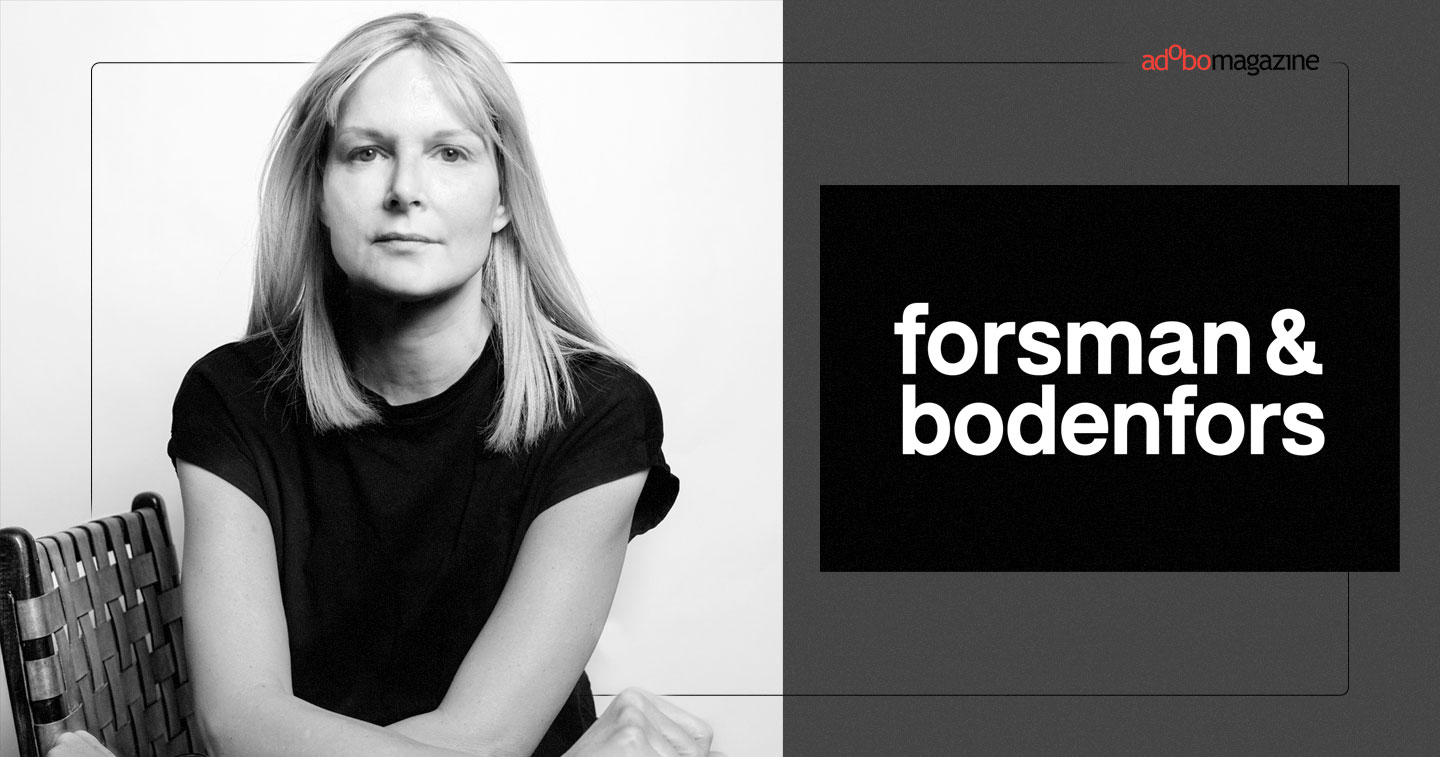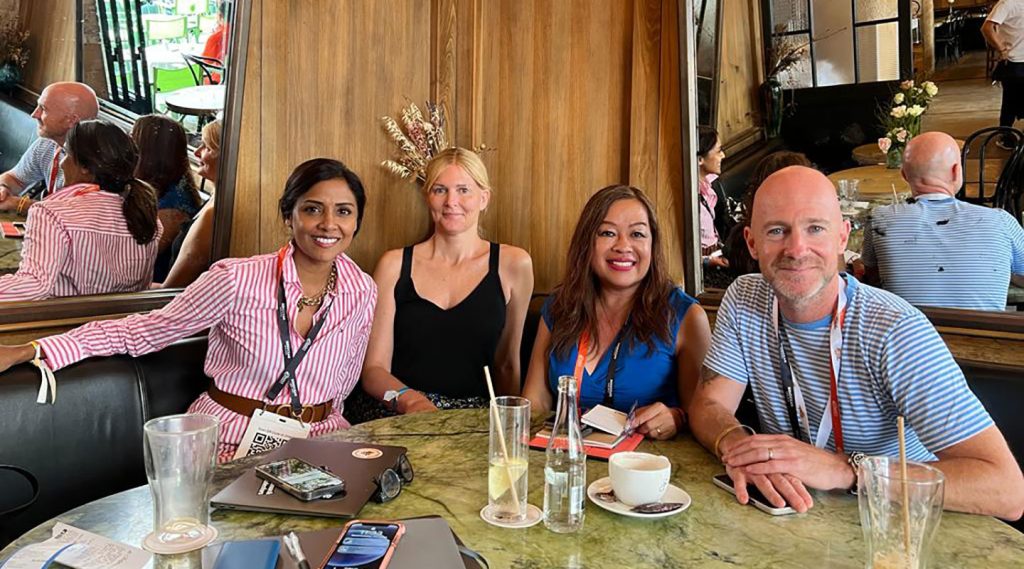adobo Exclusive: F&B Global Creative Chairman Anna Qvennersted on climbing the ranks as a woman leader, cultivating talent, and ‘true innovation’

MANILA, PHILIPPINES — Forsman & Bodenfors (F&B) is going through some exciting times, experiencing a renaissance — complete with new leadership, a new global direction, and a new attitude — after 35 years. However, while this marks the beginning of a new chapter for one of the world’s most awarded creative agencies, the basics of what they stand for stay the same: continuing their legacy of excellence and solving problems with unparalleled creativity.
At the helm of this renaissance is Anna Qvennersted, the global creative chairman of F&B. In addition to working as a creative — she calls herself a copywriter first and foremost after all — Qvennersted co-leads F&B with seven offices across three continents and has been working at the agency for the past 18 years.
adobo Magazine Editor-in-Chief Angel Guerrero sat down with Qvennersted to discuss what it’s like to be a woman creative, her creative ambitions, and the work culture at F&B.
Qvennersted has been part of the industry for a long time. In fact, in 2007, she was the youngest recipient in Sweden of the Platinum Egg, an award that recognizes individuals who have had an exceptional impact on the advertising industry. This is just one of the many recognitions she has been awarded in her career — a career in which she rose as a young female creative at a time when men dominated creative leadership roles.
“I must say it’s also a matter of timing, to be at the right place at the right time. And I was lucky enough in the sense that I was at good agencies where I was listened to,” she told adobo Magazine.
“The circumstances were good for me, and at the time things started to happen for me creatively, it also was when people were starting to really look for female representation,” Qvennersted continued. She said she was very young when she started judging at Cannes and at other awards shows because they needed more women. “When it started to happen, in every panel, they were like, ‘Can you be in the panel? Can you be on the jury?’”
“Although, I must say, when I look back now, and I think about some of the stuff that happened in the 90s and early 2000s, I can see that I should have been way more critical,” she admitted. “I think I was also guilty of sometimes laughing along at the wrong type of jokes.”
Qvennersted added that although things were easier for her in terms of rising through the ranks and getting creative opportunities, she was not spared from being talked over and other sexist behavior in male-dominated spaces. “I get really angry when I’m talked over, and [when it happens] I’m not having it.”
She recounts an instance when she was in a jury room of mostly men when they were judging a particularly sexist entry. “[The entry] was an idea where a brand would compare the looks of women from the different countries that were competing […] And there were talks of it being shortlisted or even [being] a winner, and I was protesting. They were booing, [they were] like, ‘Oh, we have a feminist in the room.’”
When asked if she would’ve fought even harder if something like that had happened today, she said yes, but clarified, ”But I think every single time I’ve been judging here I have been fighting for [that.]”
On the topic of sexist creative work, Qvennersted said she’s seeing less of that in judging rooms in recent years and that there’s also progress in terms of the reception when inclusion and diversity are embraced by brands. This even includes brands in fashion, which she called a traditionally normative industry.
“If you look at H&M whenever they post someone who is either a bigger person or someone body positive, they get so much love. It’s like [the post is] drowning in love,” Qvennersted offered as an example. “You can see the engagement on the posts are way higher, and it will be filled with [comments that] say, ‘I love you for doing this.’”
Qvennersted shared that this progress in women’s representation in advertising is something that they’ve been seeing and championing at F&B as well.
“I think many people definitely are very conscious of this. So, I think these conversations are happening pretty much everywhere,” she said. “Diversity and inclusion are things that we are working with, [and] we are educating ourselves. I think most clients that we work with are looking for that. And quite often we have female clients, so it’s not [always just] me trying to convince [them.]”
One of F&B’s works that exemplifies this is the “Marriage Takeover” campaign for SK-II in China. The film tackled the issue of Chinese women being called “Sheng Nu” or “leftover women” once they turn 27 years old without getting married. Exploring the societal and familial pressure on women to marry young, the film shows how powerful these women are and the courage it takes to not let the stigmatization of unmarried women dictate their future.
Qvennersted said that there are many instances of clients wanting to do purposeful work like this one, even though it’s not something they say outright. “Maybe they don’t come and say ‘We want purposeful work.’ But they want to have a role. They want to be something in the world that is not just about selling stuff. [So, they’ll say] ‘We do this because we want people to feel better in this way or for the environment’ or whatever. We don’t have one single client that doesn’t want to feel that they have a role in the world.”
“It’s important to truly believe in what you do for everybody,” she added. “I think that’s been the case for 30 years.”
Another exemplary work of the agency that shows authenticity when it comes to creating campaigns with a purpose is their partnership with Down Syndrome International (DSi) and The Digitals to create Kami, who is the world’s first virtual influencer with Down Syndrome. It became their way of revolutionizing the digital space that left no room for people who are different, including those with Down Syndrome. So, with Kami — who is an amalgam of 100 real young women with Down Syndrome who are a part of this work — more diversity is introduced into the world of virtual influencers.
This collaboration with tech is one of the many instances wherein F&B has not shied away from working with digital companies and platforms when it was needed to achieve an idea.
“We are definitely really close to many of these [tech and digital] platforms. We are seeing them on a regular basis. We can invite someone from TikTok or from Facebook or whatever to come and look at an idea at an early stage,” Qvennersted shared. “What never gets old is that approach [of finding] the right product and asking ‘How can we actually solve this problem if we could do anything?’ That perspective never gets old.”
“We are very much a collaborative group of people,” she assured. “We’ve never been difficult with [that. If someone can contribute, that person is welcome.”
And that collaborative spirit and ‘if you can contribute, you are welcome’ mindset doesn’t just apply to partnerships with other agencies and companies. It’s also how teams are run at F&B.
While most agencies have traditional hierarchies where the people at the top teach everyone else, that’s not the case here. Qvennersted shared that their work culture allows everyone from all levels to collaborate and offer their own ideas regardless of their position. As Global CEO Toby Southgate put it, what he first noticed when he joined the agency last year was that even those in junior positions got to have their inputs heard and do things “not as juniors who are there to learn, but as contributors.”
And it’s not difficult to trust even the most junior members of a team, because F&B is very selective about who to welcome to the family to make sure the fit is right. Qvennersted mentioned that the hiring process involves “many people” and “many interviews” until they find the right person.
“[Finding talent in] Sweden is probably the smallest problem because I think we have so much great local talent,” Qvennersted expressed. “I think we’ve seen so many times — and I’m talking maybe more specifically around creatives — that if you’re the right person, if you have the right attitude, and the right talent, and if you’re in it for the right reasons and you’re a great person, you can flourish.”
She then clarified, “The right reason is wanting to solve problems with creativity [and having that] collaborative spirit. Wanting to be part of a team and wanting to help others.”
It’s with teams that embody those qualifications that Qvennersted feels ready to take on the wider creative ambition that F&B strives for during this renaissance. One of those goals, she shared, is winning 20 Lions next year. And with the evolution that’s happening at the agency, they seem to be on track.

“We have everyone sitting together in Sweden with all the different capabilities in the same house, which is a great opportunity for everybody. We can influence each other. We are also working across offices and markets in another way where we have the product community that comes together and talks about ideas. [And when] the product community meets, it’s not about formalities or checking any stuff. It’s [about] looking at the ideas and the opportunities and the clients and actually working creatively together to see how we can work, how we can help the teams, [and what we can] do to give them the right opportunities.”
Qvennersted made sure to clarify that they are not just chasing awards for awards’ sake and that what’s important for F&B first and foremost is being a problem solver. “I think we’ve historically been very conservative around talking about [awards] because it’s been so inherently important to the agency that we are problem solvers. We are doing this together with clients to make something better. And if we start to talk too much about awards, something changes.”
She goes on to talk about how it’s in that dedication to and focus on problem-solving that one can find what can really make work great. “[When we] don’t think about winning and what other agencies are doing, [that’s when] we do innovative work,” she said. “So, true innovation will not come from wanting to win an award.”
The post adobo Exclusive: F&B Global Creative Chairman Anna Qvennersted on climbing the ranks as a woman leader, cultivating talent, and ‘true innovation’ appeared first on adobo Magazine Online.
